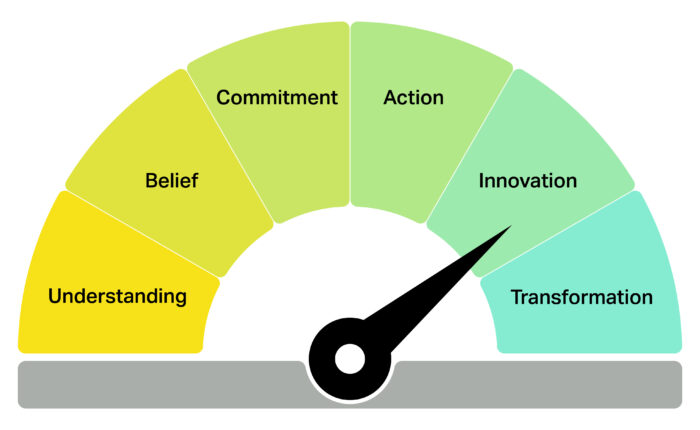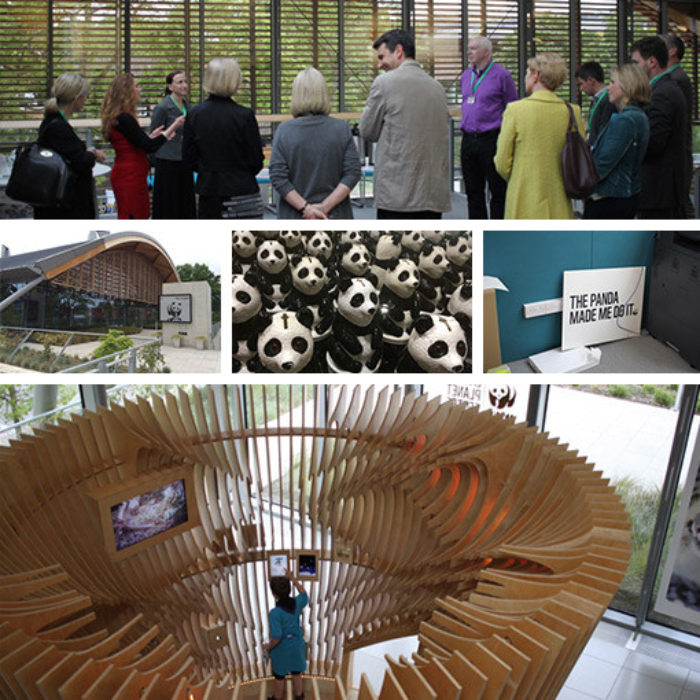5 attributes to help you accelerate your sustainability culture
We’ve recently been reflecting on the challenges we all face on climate, society, environment, biodiversity etc., and on the fact that it feels like the 1.5oC goal is passing us by. And we’re asking ourselves where are the signs of hope? Where is leadership and action coming from?
With this thought on my mind two things cropped up over the weekend. Firstly I ‘tripped over’ a quote from the late, great American folk singer, Pete Seeger. A lifelong civil rights activist and environmental champion, he wrote (at the age of 89) this powerful lyric for his song “If It Can’t Be Reduced”:
“If it can’t be reduced, reused, repaired, rebuilt, refurbished,
refinished, resold, recycled or composted, then it should be
restricted, redesigned or removed from production.”
It’s a marvellous maxim (if not a particularly good song), and one we could all take to heart. It also set me to thinking about how far organisations have come on their own sustainability journeys in the 15 years since Seeger wrote those words, and how much more scope organisations have to minimise the environmental impacts of their operations.
Embrace radical ideas
The second weekend moment was that I picked up a rumour from a recent talk on sustainability in architecture, that a certain furniture giant is considering transforming its whole distribution model to source more materials locally, even to the extent of, where possible, changing some of the materials content in the products it sells in different markets to what’s most locally available.
Whatever the reality, that’s a radical idea, especially if it was adopted at the global scale. It would speak to not only a deep commitment to maximising sustainability, but to an incredible confidence that the supply chain and marketplace is ready for such an endeavour.
Being able to make that scale of transformative change also says a lot about organisational culture and brand. This big a shift would require you to have a mature, ambitious and deeply embedded sustainability culture, inside and outside the business, with fully bought-in employees, shareholders, stakeholders, suppliers and customers. Let’s hope it pans out.
Another business with a transformative and well-documented sustainability culture is Patagonia. The outdoor clothing brand, which turns 50 this year, was founded around a central pillar of sustainability, and has never looked back: it claims ownership of the carbon footprint of its entire supply chain; it supports community-led efforts to go fossil-fuel free; it provides climate activists with millions in funds; and describes the planet as its only shareholder, putting all profit dividends towards fighting the climate crisis. To help close the loop it even has a ‘Worn Wear’ sub-brand for buying back and selling on pre-loved apparel items.
If we’re going to see the required scale and pace of change, we need more organisations – and governments – to demonstrate this level of understanding, belief and bold transformative action.
Hit the accelerator
Getting to that level of sustainability impact requires a progressive journey, driven by a culture that can truly imagine and deliver transformation. I’ve looked to capture the various levels below in what we could call the sustainability culture accelerator.
Sustainability culture accelerator
The accelerator is a handy tool to gauge where any organisation, including your own, is on its sustainability culture journey. Where would you be right now? A culture of sustainability action? One of innovation in sustainability? Where do you aspire and/or expect to be in the coming years? And what is the scale of change and positive impact you could unlock?
Move the needle
Every organisation can look at the sustainability culture accelerator and see that they still have room to improve. And that’s fine. What matters is seeing where you need to be, working out how to get there, and doing so at pace – because time is running out.
The accelerator is a useful tool then for beginning to imagine what you have to do to move the needle. What are the cultural attributes that enable a business to go from, say, belief in the tenets of being sustainable, to delivering associated actions, to implementing a wholly transformative approach that’s lived across the whole company?
Creating that sustainability culture requires much more than just an aspirational vision, purpose or sustainability statement. Most organisations already have those, and too many don’t pay much more than lip service to them. We need to go beyond the words. To find something in the fabric of the organisation, that’s reflected in all aspects of its operation. It’s both what you do, and the way you do it.
I’ve identified five cultural attributes that organisations with transformational sustainability cultures share:
- Being open to questioning the status quo.
- Being visionary by understanding the context and seeing the future.
- Being courageous in making the bold decisions.
- Being innovative by imagining, creating and delivering new solutions or business models.
- Being collaborative by recognising that we can only achieve our goals by working together with others.
I’m sure there are more. We’d love to hear about the cultural attributes that help you drive action and change on climate and sustainability in your company.
Build momentum
Ultimately, the stronger your culture of sustainability, the more performant and resilient your business. It promotes innovation, potentially fuelling the creation of new products and services, and even new markets. It also boosts your reputation, and gives potential market stand out.
A climate-positive culture gives employees a stronger sense of shared purpose and pride in their employer. And in the current war for talent, a reputation for sustainability is a powerful recruitment tool, especially with younger generations, where highly skilled and motivated millennials and Gen Zs are looking for a business that share their values.
Creating a stronger sustainability culture is a challenge, but it’s an essential part of the journey for your organisation, and for all of us, in the face of the climate crisis.
To discuss where your business is on the sustainability culture accelerator, where you want to be, and how to start moving the needle, just give me a call.





